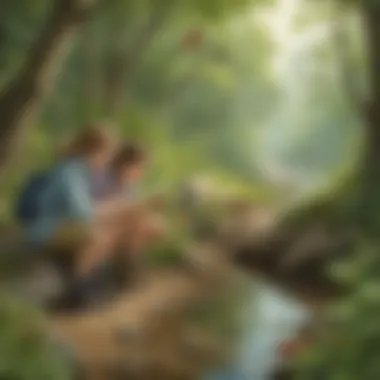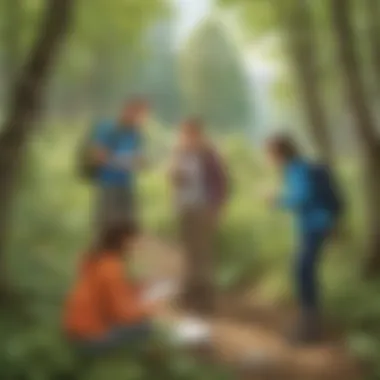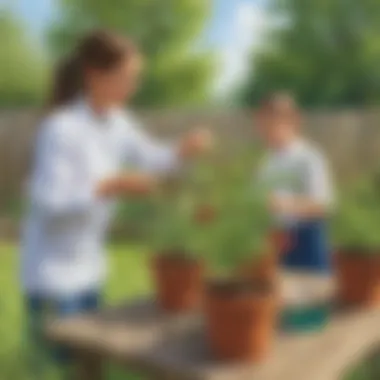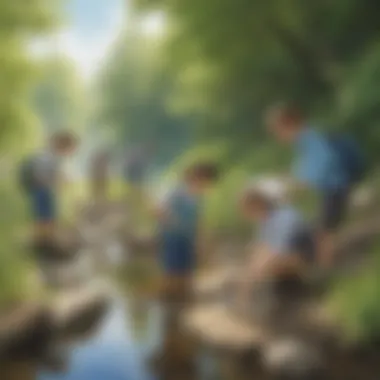Engaging Outdoor Science Activities for Young Learners


Intro
In a world where technology dominates daily life, integrating outdoor science activities into elementary education is paramount. These activities address the critical need for experiential learning that engages children with their environment. The outdoors offers a dynamic classroom that stimulates curiosity and nurtures foundational scientific inquiry skills. Educators and parents find that kids learn best when they can see and touch the concepts they study. This article will explore various engaging outdoor science activities, emphasizing how these experiences can promote teamwork, observation skills, and a deeper appreciation of the natural world.
Fun Activities Ideas
Indoor Activities
Not every engagement needs to happen outside the house. Certain indoor activities can bridge concepts with nature. One effective approach involves creating a miniature ecosystem using aquariums or clear containers. Children can observe plant growth, water cycles, or even simple food chains. Another option is to have a science corner with hands-on experiments that children can try use common household materials. Urban gardening, even indoors, can ignite a form of continuous sustainable practice, where kids engage with nature closely, even if it requires a bit of imagination.
Outdoor Adventures
Leading children into nature is where real learning flourishes. School trips to botanical gardens or nature reserves can facilitate firsthand experiences. Activities like nature scavenger hunts help children develop observation skills. Kids can identify various plants and insects while learning their significance to ecosystems. Hiking trips engage them in environmental appreciation and teamwork, allowing them to mark changes in landscapes as seasons shift.
Arts and Crafts
Art projects that incorporate natural materials can solidify scientific principles in a creative way. Children can make leaf rubbings or clay impressions of various textures found at a park. Gathering twigs and stones, they can build dioramas that simulate different ecosystems. Similarly, planting seeds in biodegradable pots lets them create their own natural artwork, teaching them about plant biology as they nurture their creations.
Science Experiments
Simple experiments conducted outside can illustrate key principles effectively. For instance, a homemade volcano using vinegar and baking soda offers a fantastic way to demonstrate chemical reactions. Kids can investigate the pH of soil samples they collect from different locations. This hands-on learning fosters curiosity, forming connections to theoretical concepts they're learning in class.
Cooking and Baking
Cooking with kids provides another layer of learning. It’s an opportunity utilize plants grown at home. Homemade herb bread or nutritious salads can introduce concepts about nutrition, botany, and even chemistry as they observe how ingredients change in cookery processes. Implementing themed outdoor cooking classes allows children to glean essential culinary skills while they reflect on where their food comes from.
Educational Games
Various types of educational games enhance outdoor exploration. They offer challenges that demand teamwork and problem-solving.
Math and Logic Games


Setting up math scavenger hunts can sharpen children's counting and logic skills. They can find items in nature, measure them, and solve math puzzles along the way to keep them engaged and academically active.
Language and Vocabulary Games
Word games that relate to observed plants or wildlife vividly enhance vocabulary. Children can develop a glossary of the flora and fauna they encounter, promoting rich discussions and deeper understanding.
STEM Activities
Robotics or technology-centred challenges often blend seamlessly with outdoor contexts. Kids can design weather stations, utilize coding skills, or even launch mini rockets while tracking their scientific data.source
History and Geography Puzzles
Visiting historical sites outside also teaches geography concepts. Setting up educational clues at various landmarks encourages critical thinking and enhances memory recall.
Interactive Learning Apps
Using technology wisely can offer enriched outdoor experiences. Apps tie in nature identification and star-gazing applications for relevant fun, merging play-time and knowledge to enhance accessibility.
Seasonal and Holiday Activities
Integrating seasonal and holiday celebrations fosters creativity:
Valentine's Day Crafts
Making heart-shaped planters with succulents not only results in handmade gifts but also appreciation for local flora.
Halloween Costume Ideas
Discussing nature or space-themed costumes is an engaging topic for kids, and crafting costumes encourages imaginative thinking.
Thanksgiving Cooking Projects
Using residual plants to cook can explore sustainability while appreciating the environment.


Christmas Decorations
Creating nature-based ornaments from twigs or pine cones shows kids responsibility in nature's lifecycle.
New Year's Resolutions for Kids
Encouraging personal growth through Nature is possible. The desire to improve is reflective, making Earth-friendly commitments meaningful.
Parenting Tips and Resources
Parents can foster an atmosphere of creativity and exploration.
How to Encourage Creativity
Emphasizing light stimulation, offering multifactor experiences encourages individual self-expression associated with outdoor activities.
Setting up a Playful Learning Environment
Creating a backyard corner designed for adventures can inspire varied engagement levels, allowing children to explore freely, inviting inquiry into the modest smallest detail they might encounter in curated nature.
Balancing Screen Time and Playtime
Defining clear distinctions between productive usage of screens and time spent outside yields a healthier lifestyle.
Building Strong Family Bonds
Collecting memories connected to space adventures or nature observation fosters connection involving all family members.
Motivating Kids to Stay Active
Organizing community outdoor events teaches children organizational skills while connecting back to nature.
Fun Facts and Trivia


Enhancing knowledge through trivia goes a long way. Informational fun can excite children about various scientific themes.
Animal Kingdom Discoveries
Investigating native species sheds light on biodiversity, touching on issues linking natual preservation and respect for species.
Famous Inventions Stories
Listing what common objects hinges back onto. Discuss specific inventions received their power or nature draws parallelint.
Historical Events for Kids
Targeting notable themes from various timelines can create an urge to learn deep-rooted stories embedded unlike easily memorized events.
Mythical Creatures Explorations
Discussing folklore and stories helps children relation between imaginary conversations & existing nature ambiguity.
Space Adventures and Discoveries
Extraterrestrial cartoons or observational events can pluck curious minds aspiring from nay of the planets reflection emitted reach.
Learning in nature sparks lasting change. Practical applications build life tiered and enrich learning pathways.
By experiencing the world outdoors, elementary students lay the groundwork for a steed into life encased beyond confines cast within typical instructional realms.
Preamble to Outdoor Science Activities
Outdoor science activities serve as a crucial component in early education, combining the dynamics of classroom learning with the vast potential of the natural environment. As we delve into this topic, it becomes clear how these activities facilitate not only educational outcomes but also emotional and social development in children. By stepping outside the confines of traditional learning methods, students engage in experiential learning that emphasizes observation, inquiry, and critical thinking.
The Importance of Hands-On Learning
Hands-on learning forms the crux of effective educational practice, particularly for elementary students. This method allows students to directly interact with the world around them. Children are naturally curious; outdoor science activities harness that curiosity, channeling it into productive explorations of scientific concepts.
In actuality, engaging in tangible experiences solidifies theoretical knowledge. When students observe a bug up close or dig into the soil, concepts become less abstract and more relatable. This relevance encourages deeper understanding, as learners are often more likely to recall experiences compared to facts delivered in isolation within classroom walls. It essentially creates scientists out of children, fostering skills that last well beyond their elementary years.
- Encourages inquiry: Students learn to ask questions and seek answers.
- Develops fine motor skills: Handling materials, planting seeds, or measuring specimens enhances dexterity.
- Instills curiosity: Engaging directly with nature promotes an unending quest for knowledge.



